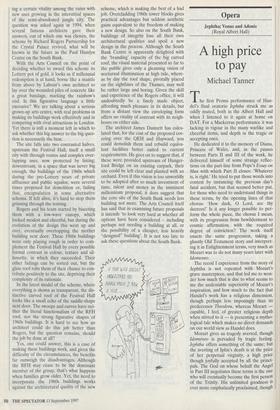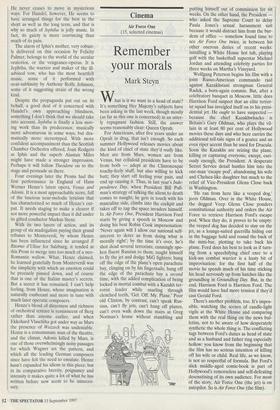Opera
A high price to pay
Michael Tanner
The first Proms performance of Han- del's final oratorio Jephtha struck me as oddly muted, both in the Albert Hall and when I listened to it again at home on DAT. For a Mackerras performance it was lacking in vigour in the many warlike and cheerful items, and depth in the tragic or accepting ones.
He dedicated it to the memory of Diana, Princess of Wales, and, in the pauses between Parts II and III of the work, he delivered himself of some strange reflec- tions on the part-line from Pope's Essay on Man with which Part II closes: 'Whatever is, is right.' He tried to put those words into context by instancing the previous day's fatal accident, but that seemed better put, for those who need to understand things in these terms, by the opening lines of that chorus: 'How dark, 0 Lord, are thy decrees!' Is it any longer possible to per- form the whole piece, the chorus I mean, with its progression from bewilderment to cosmic affirmation, with the required degree of conviction? The work itself enacts the same progression, taking a ghastly Old Testament story and interpret- ing it in Enlightenment terms, very much as Mozart was to do not many years later with Idomeneo.
The recoil I experience from the story of Jephtha is not repeated with Mozart's grave masterpiece, and that led me to won- der how much that is due to what seems to me the undeniable superiority of Mozart's inspiration, and how much to the fact that Handel's work has a religious dimension, though perhaps less imposingly than its predecessor Theodora, whereas Mozart capable, I feel, of greater religious depth when stirred to it — is presenting a mytho- logical tale which makes no direct demands on our world view as Handel does.
Mozart gives us tragedy averted, though Idomeneo is pervaded by tragic feeling. Jephtha offers something of the same; but the averting of Iphis's death is at the price of her perpetual virginity, a high price though joyfully accepted by all the princi- pals. The God on whose behalf the Angel in Part III negotiates these terms is the one who will eventually become the first person of the Trinity. His unlimited goodness is ever more emphatically proclaimed, though He never ceases to move in mysterious ways. For Handel, however, He seems to have arranged things for the best in the short as well as the long term, and that is why so much of Jephtha is jolly music. In fact, its gaiety is more convincing than much of its pain.
The alarm of Iphis's mother, very robust- ly delivered on this occasion by Felicity Palmer, belongs to the world of the secular oratorios, or the vengeance-operas. It is Jephtha, the warrior and maker of the ill- advised vow, who has the most heartfelt music, some of it performed with near-sublimity by Anthony Rolfe Johnson, some of it suggesting strain of the wrong kind.
Despite the propaganda put out on its behalf, a good deal of it concerned with Handel's own approaching blindness, something I don't think that we should take into account, Jephtha is finally a less mov- ing work than its predecessor, musically more adventurous in some ways, but dra- matically more stereotyped. With more confident accompaniment than the Scottish Chamber Orchestra offered, Joan Rodgers as Iphis and the superb Alastair Miles might have made a stronger impression. Perhaps it will follow Theodora on to the stage and persuade us there.
Four evenings later the Proms had the first performance in England of Hans Werner Henze's latest opera, Venus and Adonis. It is a most approachable score, full of the luscious near-melodic lyricism that has characterised so much of Henze's out- put. It needs staging to make a clearer if not more powerful impact than it did under its gifted conductor Markus Stenz.
With its two layers of action, and its group of six madrigalists paying their grand tributes to Monteverdi, by whom Henze has been influenced since he arranged Il Ritomo d'Ulisse for Salzburg, it tended at this Prom to merge into too much of a neo- Romantic wallow. What, Henze claimed, he learned gratefully from Monteverdi was the simplicity with which an emotion could be precisely pinned down, and of course that is one of the Italian master's secrets. But a secret it has remained, I can't help feeling, from Henze, whose imagination is naturally exuberant and more in tune with much later operatic composers.
Henze's blend of directness and richness of orchestral texture is reminiscent of Berg rather than anyone earlier, and when Ekkehard Vlaschiha got under way as Mars the presence of Wozzeck was undeniable. Henze is a consummate man of the theatre, and the climax, Adonis killed by Mars, is one of those overwhelmingly noisy passages for which Wagner set the pattern, and which all the leading German composers since have felt the need to emulate. Henze hasn't expanded his idiom in this piece; but in its comparative brevity, poignancy and intensity it makes quite a lot of what he has written before now seem to be unneces- sary.



































































 Previous page
Previous page